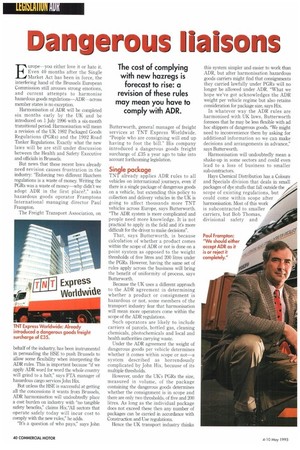Dangerous liaisons
Page 52

If you've noticed an error in this article please click here to report it so we can fix it.
The cost of complying with new hazregs is forecast to rise: a revision of these rules may mean you have to comply with ADR.
Europe—you either love it or hate it. Even 40 months after the Single Market Act has been in force, the interfering hand of the Brussels European Commission still arouses strong emotions, and current attempts to harmonise hazardous goods regulations—ADR—across member states is no exception.
Harmonisation of ADR will be completed six months early by the UK and be introduced on 1 July 1996 with a six-month transitional period. Harmonisation will mean a revision of the UK 1992 Packaged Goods Regulations (PGRs) and the 1992 Road Tanker Regulations. Exactly what the new laws will be are still under discussion between the Health and Safety Executive and officials in Brussels.
But news that these recent laws already need revision causes frustration in the industry: "Enforcing two different Hazchem regulations is a waste of money. Writing the PGRs was a waste of money—why didn't we adopt ADR in the first place?," asks hazardous goods operator Framptons International managing director Paul Frampton.
The Freight Transport Association, on behalf of the industry, has been instrumental in persuading the HSE to push Brussels to allow some flexibility when interpreting the ADR rules. This is important because "if we apply ADR word for word the whole country will grind to a halt," says PTA manager of hazardous cargo services John Flix.
But unless the HSE is successful at getting all the concessions it wants from Brussels, ADR harmonisation will undoubtedly place a cost burden on industry with "no tangible safety benefits," claims Hix."All sectors that operate safely today will incur cost to comply with the new rules," he adds.
"It's a question of who pays," says John Butterworth, general manager of freight services at TNT Express Worldwide. "People who are consigning will end up having to foot the bill." His company introduced a dangerous goods freight surcharge of £35 a year ago to take into account forthcoming legislation.
Single package
















































































































